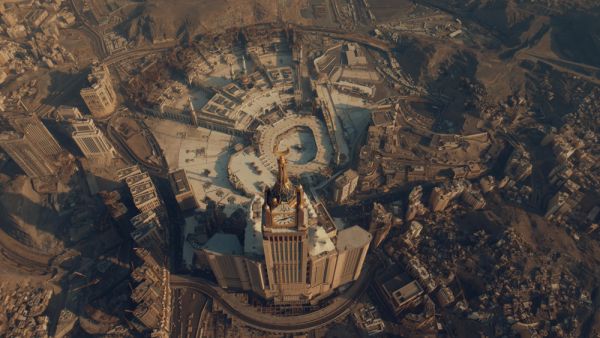Saudi Arabia is battling to contain a coronavirus outbreak in Mecca amid fears that crowded slums and labour camps are hotspots for infection.
The Islamic holy city, which has a population of two millions people, has seen more than 1,000 reported case of the virus.
Mecca's large number of undocumented immigrants and cramped housing for foreign workers could have played a part in an increased rate of infection, Bloomberg reports.
Every year millions of Muslims make a pilgrimage to Mecca - which was one of the first Saudi cities to face a full-day curfew - but religious tourism was banned in February with mosques across the country shut the following month as the coronavirus crisis deepened.
Saudi Arabia's capital city Riyadh - more than three times the size of Mecca - has seen 1,422 cases of coronavirus.
Late last month five employees of a construction company tested positive before authorities locked down the housing of 8,000 labourers, suspending work on expanding the grand mosque, it has been reported.
The health ministry reports that foreigners - who account for roughly a third of the Saudi population - make up between 70 and 80 per cent of new cases, sparking debate about their role in the country.
Authorities have promised free coronavirus treatment for foreign residents - undocumented immigrants included.
As many as 150 members of the Saudi royal family are infected with coronavirus, it has been reported. It was claimed that King Salman and Mohammed bin Salman both went into isolation to avoid the outbreak.
Elsewhere in the region, charity workers are scouring the United Arab Emirates for empty buildings and Bahrain is repurposing closed schools to rehouse low income labourers from overcrowded accommodation, a hotspot for the coronavirus outbreak in the Gulf.
The challenge is not limited to the region's congested labour camps, where one room with bunk beds can sleep about a dozen workers, the virus has also spread in densely populated commercial districts where many expatriates share housing to save on rent. Many have lost jobs and are struggling.
Indian engineer Mohamed Aslam shares a three-bedroom apartment in the UAE capital Abu Dhabi with 14 other people. Health authorities put the building under quarantine after some residents tested positive for the virus.
'The charities are covering the food: dinner, lunch, breakfast,' he said. 'Praise be to God, because of charity we are surviving.'
Aslam is among millions of foreign workers, many from Asia, who form the backbone of Gulf economies and work in the construction, hospitality, retail, transport and services sectors, many of which have been disrupted by the outbreak.
Most of the six Gulf Arab states have taken measures to curb the spread of infection, initially linked to travel, by suspending passenger flights, closing most public venues and imposing curfews. But the number of cases has steadily risen to surpass 16,500 with 111 deaths.
Several states have said they face a challenge with migrant workers. Some, including the UAE's Dubai emirate, Qatar, Oman and Kuwait, have locked down areas with a large population of low wage workers. All have stepped up testing.
In Saudi Arabia, a video widely circulated on social media showed at least 15 foreign workers being ushered out of one room with bunk beds to be tested for the virus. A Saudi official confirmed the authenticity of the video.
Gulf governments said they are sterilising labour camps as part of disinfection drives. Bahrain said it would use schools to separate workers. Two charity groups in the UAE said they were looking for empty buildings where workers could isolate.
'Many people are infected and are staying with other people,' Krishna Kumar, president of UAE-based Kerala Social Centre said. 'We are trying to isolate them.'
Three doctors in the UAE, who spoke on condition of anonymity, said overcrowding is one of the biggest factors for the surge in cases. 'We have seen clustered outbreaks in the labour camps,' one of them said.
Several Gulf Arab states have allowed outbound flights for expatriates who have lost jobs or been put on leave, but some countries say they are not prepared to take them back.
In the UAE, diplomats and four charities said they were delivering thousands of meals, medicine and other essentials each day to people who had become destitute.
Indian national Abdulla, who declined to give his last name, said he had not worked at his Abu Dhabi retail job for two weeks and was relying on charity. A Ugandan office assistant living in a labour camp in Dubai's Jebel Ali, who declined to be named, said he had not been paid in weeks.
The UAE has said it would review labour ties with states refusing to repatriate citizens after the ambassadors of India and Pakistan said their countries were not yet ready to do so.
'We're aware of all of those who have been laid off and their plight,' Sayed Zulfiqar Bukhari, special assistant to Pakistan's prime minister, told Reuters in Islamabad.
'We're just waiting to create the right mechanism so that we don't overburden the system of taking people in here,' he said, adding airlines needed to be equipped for safety.
Bangladesh Expatriate Welfare and Overseas Employment Minister Imran Ahmed said Dhaka was working to alleviate citizens' hardships, including sending money to foreign missions 'so that migrants in trouble can be taken care of'.
A Philippines official said citizens overseas can qualify for a government stipend of $200.
Valerie, a Filipina receptionist in Dubai who shares a one-room studio with five others, had her wages cut and is digging into savings to support her parents and six siblings back home.
'I'm worried about my family if I lose my job,' she said, adding that she worries about going out to buy groceries. 'It's scary. We don't know if we will bring back the virus with us.'
Medics have warned that the Islamic festival of Ramadan could lead to a 'big spike' in coronavirus infections when British Muslims celebrate holy month.
This year Ramadan is set to begin on April 23, with around three million Muslims across the UK celebrating the religious holiday.
But a consultant at Queen Elizabeth Hospital in Birmingham has now claimed that more social interaction during the holy month could lead to an increase in cases.
Dr Adnan Sharif said the amount of social interaction during the festivities could be a worry.
'People traditionally gather to open and close prayers and break fast at sundown with friends and neighbours, which could cause a big spike in infections.'
His fears were echoed by Neil Hubbard, speaking for the Independent Doctor's Association, who said, 'he has a point'.
Dr Adnan works at a hospital where four in 10 Covid-19 patients are from a black, Asian or ethnic minority (BAME).
His warning regarding Ramadan echoes concerns from the British Medical Association (BMA).
The BMA recently launched an inquiry into why people from BAME backgrounds are more susceptible to such respiratory conditions.
Speaking to The Times Dr Adnan added: 'They usually have households of multiple occupancy, where grandparents, parents and children all live in the same home and there is lots of communal activity.'
Mr Hubbard, who is currently working on AI in cancer diagnosis and transplant research, said: 'If you were to examine why the Government has closed all churches and then look at the spread in Italy where there are many older people going to mass sometimes daily, you will see that the good doctor may have a point.'
Ramadan is the ninth month of the Islamic calendar and is observed by Muslims worldwide as a month of community, fasting, prayer and reflection.
It is a commemoration of the Prophet Muhammad's first revelation and the observation of Ramadan is regarded as one of the five pillars of Islam.
There are worries that this increased sense of community may lead to people breaking social distancing rules.
One of the main events of Ramadan is the Iftar dinner, that signifies the end of the fast.
This is usually when family and friends would gather to eat together.
Virtual Iftars have been scheduled by some groups, so people can still celebrate and enjoy a traditional Iftar without breaking social distancing guidelines and putting others at risk.
The Ramadan Tent Project said such virtual events will help people celebrate the end of the fast safely.
People will celebrate from home this year with their loved ones, they will pray at home and if they so wish, can join virtual events set up by different organisations across the country.
Speaking to MailOnline Harun Khan, Secretary General of the Muslim Council of Britain said: 'When it comes to the coronavirus crisis, the majority of mosques suspended all congregational activities even before the government required their closure and not a single mosque has been found to be breaking the guidelines.
'In fact, we are seeing unprecedented innovation as mosques are adapting to social distancing measures and acting as a virtual hub for volunteering and supporting our NHS. We can only hope the accurate reality can be portrayed rather than the musings of one individual'.
Last week Church of England vicars across the UK threatened to revolt and go to churches to host Easter Sunday services despite the Archbishop of Canterbury's orders to stay at home.
It followed Tory MP Jack Lopresti, for Filton and Bradley Stoke, calling for churches to open on Easter Sunday to give hope to Christians during the crisis. His call, made in a column for the Telegraph, sparked criticism over his suggestion people broke lockdown.
There were similar concerns around the Jewish Passover festival after many gathered to celebrate Purim earlier this year. The festival, dating back 2,500 years, took place on March 9 and March 10, shortly before social distancing rules were brought into place, and lockdown on March 23.
Archbishop Welby even pre-recorded his Easter Sunday service himself and urged others to do the same in order to avoid them attending churches and going outside unnecessarily.
Those who said they would defy the rules set out by Mr Welby claimed they were being threatened with disciplinary measures over the weekend.
One vicar said 'it was time to revolt' and another claimed they had 'been going to church since lockdown'.
They said they would continue to do so, adding they would be attending at 10.30am on Easter Sunday.
The Rector at London's St Luke's Wimbledon Park Rev James Paice told the Telegraph over the weekend: 'If people can go to supermarkets and get food and stand less than two metres apart from others, then why can't clergy go into an empty building on their own?
'The advice that clergy should get shopping but not enter their buildings alone to minister online elevates the humanistic and practical above the spiritual.'
He added: 'I've been going every Sunday to a room in my church. Ever since the lockdown I have been doing it, and I will do it at 10.30am on Easter Sunday. Other clergy are doing it from the main body of church.'
So far in the UK 12,107 people have died from the coronavirus and there have been over 93,000 confirmed cases of the virus.
Public Health England is currently reporting the deaths on a daily basis.
However the figures could actually be much higher, as this is just the number of patients that have died in hospitals from the virus over the last 24 hours.
This article has been adapted from its original source.








